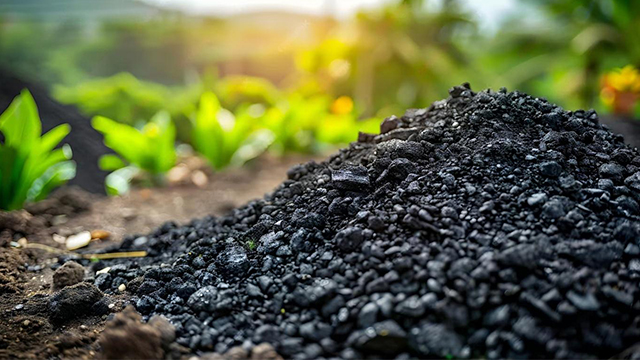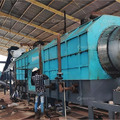The biochar industry is rapidly expanding, driven by the growing demand for sustainable solutions in agriculture, construction, and waste management. As the production of biochar becomes more critical to environmental sustainability, manufacturers are tasked with selecting the right equipment to ensure high-quality output and efficient operations. A biochar machine is a central component of the production process, and the choice of the right one can significantly impact both the economic and environmental performance of the operation.
Factors Influencing the Selection of Biochar Equipment
1. Material Type and Feedstock Compatibility
The first and foremost consideration when selecting a biochar machine is the type of feedstock that will be processed. Feedstocks can range from agricultural residues like rice husks, corn stover, and sawdust, to waste plastics and municipal solid waste. Different materials have different heating values, moisture content, and sizes, which influence the choice of pyrolysis technology.
For example, a biochar machine designed for wood-based feedstock might not be suitable for processing plastic waste. Plastic materials tend to melt at lower temperatures, while wood requires higher temperatures to achieve optimal pyrolysis. Manufacturers must assess the characteristics of their primary feedstock to ensure the machine they choose is designed to handle it effectively.

2. Pyrolysis Temperature Control
The temperature at which pyrolysis occurs plays a critical role in the quality of the biochar produced. Typically, the process occurs at temperatures between 400°C and 700°C, with the optimal range being around 500°C to 600°C. The biochar pyrolysis machine selected must have precise temperature control mechanisms to maintain these conditions throughout the process. Variations in temperature can lead to inconsistent results, affecting the quality of the biochar, as well as the production of valuable by-products like syngas and bio-oil.
A high-quality machine will feature a reliable and adjustable heating system, with precise monitoring and control of temperature to ensure that the pyrolysis process runs smoothly. In some cases, machines equipped with advanced automation systems can allow for remote monitoring and adjustments, improving overall operational efficiency.
3. Production Capacity and Scalability
Manufacturers must assess the production capacity of the biochar machine to meet their operational goals. Smaller-scale operations may require machines with lower throughput, while larger enterprises might need high-capacity units capable of processing large volumes of feedstock.
Scalability is also an important consideration. The biochar market is growing, and manufacturers must ensure that their equipment can scale as demand increases. Investing in machines that can be upgraded or expanded to increase throughput without significant operational disruptions can help businesses stay competitive in a dynamic market.
4. Energy Efficiency and Waste Heat Recovery
Pyrolysis is an energy-intensive process, so manufacturers should prioritize energy efficiency when selecting a biochar machine. Efficient machines minimize energy consumption while maximizing the yield of biochar and other by-products. Additionally, many advanced biochar machines feature waste heat recovery systems that reuse heat generated during the pyrolysis process to preheat incoming feedstock or to generate electricity.
This not only reduces the overall operational costs but also makes the process more sustainable. By selecting a biochar machine with a well-designed heat recovery system, manufacturers can significantly lower their carbon footprint and increase the economic viability of their operations.
5. By-product Management and Utilization
The biochar production process generates valuable by-products such as syngas and bio-oil, which can be used as an additional source of revenue or as fuel for the pyrolysis system itself. The biochar machine selected should allow for efficient capture and utilization of these by-products.
Syngas, for example, can be burned to provide heat for the pyrolysis process, reducing the need for external energy sources. Bio-oil can be refined into a marketable product or used as an alternative fuel. Manufacturers must ensure that the machine they choose includes systems for safely managing and utilizing these by-products, ensuring maximum efficiency and profitability.
6. Environmental Impact and Regulatory Compliance
Given the growing emphasis on environmental sustainability, it is essential for biochar manufacturers to choose equipment that complies with local and international environmental regulations. Pyrolysis processes can produce harmful emissions, so selecting a biochar machine with effective emission control systems, such as scrubbers and filters, is crucial to minimize air pollution.
Additionally, the choice of machine should align with the company's broader sustainability goals. Machines that use renewable energy sources, produce minimal waste, and are built with environmentally friendly materials can help manufacturers meet regulatory requirements and enhance their market reputation.
7. Cost of Operation and Maintenance
The initial cost of a biochar machine is only one part of the equation. Ongoing operational and maintenance costs play a significant role in determining the long-term profitability of the investment. Manufacturers should carefully evaluate the cost-effectiveness of the machine, considering factors such as fuel consumption, labor costs, and the need for routine maintenance.
A biochar machine that requires minimal maintenance and has a long lifespan will offer a better return on investment. It is also essential to factor in the cost of replacement parts, the availability of technical support, and the ease of troubleshooting.
Conclusion
Selecting the right biochar machine is a critical decision for any manufacturer in the biochar industry. By considering factors such as feedstock compatibility, temperature control, production capacity, energy efficiency, by-product management, environmental compliance, and cost of operation, manufacturers can make informed decisions that optimize both the financial and environmental performance of their operations. With the right equipment in place, the biochar industry can contribute significantly to sustainability efforts while providing a valuable resource for various industries.





